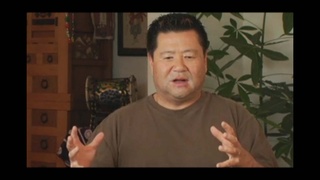Interviews
Feelings of loyalty to America while in Japan
My mother is really understandable. That is, not my grandmother -- mother. And she understand that, You are American and born there. So then says, Loyal, too, she didn't tell other, from other people because they don't want, telling the Japanese to be loyal to American. Later on, war broke out, you cannot say that, but anyway, she know the way my, she hear about it, what my grandmother treated me. So my mother knows that... but being mother-in-law, she cannot say anything, but she told me that, You're an American. If you want to go back, do it, but you gotta be loyal, too. That's my, my thing. So even though I got Japanese education and you say that, Oh, Japanese be loyal to Emperor, and things like that. But to me, still, I was young, but I'm an American. See, that came in, well, bear the fruits, to speak what I've done.
Date: December 17 & 18, 2003
Location: Washington, US
Interviewer: Alice Ito, Tom Ikeda
Contributed by: Denshō: The Japanese American Legacy Project.
Explore More Videos


Support from the Japanese American community
(b.1971) Professional figure skater and Olympic gold medalist.

Heightened awareness of identity as a Japanese American
(b. 1955) Lawyer

Reasons for conformity and competitiveness in Gardena, California
(b. 1946) Lawyer







Advantages of being Nikkei (Spanish)
(b. 1950) Nisei Chilean, Businessman


Childhood shame for being Nikkei in Enumclaw, Washington
Judge, only Japanese American to serve on CWRIC.

On the Impact of the Camp Experience
(b. 1942) The first Asian American woman judge

Thoughts on the term, "Nikkei"
(b. 1949) Musician and arts educator and adminstrator.
